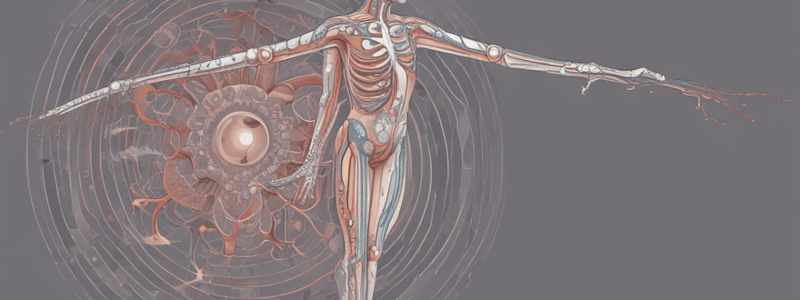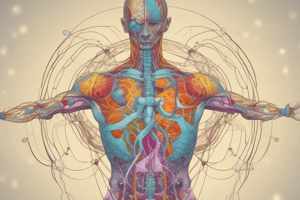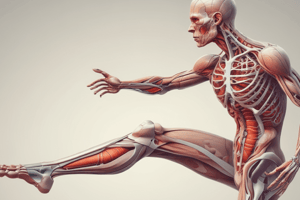Podcast
Questions and Answers
What percentage of the buffering power of the blood is accounted for by protein buffers?
What percentage of the buffering power of the blood is accounted for by protein buffers?
- Three-quarters
- One-third
- Two-thirds (correct)
- One-half
What is the primary function of the respiratory system in regulating blood pH?
What is the primary function of the respiratory system in regulating blood pH?
- Exhaling carbon dioxide (correct)
- Producing phosphate buffers
- Conserving bicarbonate
- Excreting hydrogen ions
Which of the following processes takes longer to regulate blood pH?
Which of the following processes takes longer to regulate blood pH?
- Protein buffering
- Ventilation
- Phosphate buffering
- Acid excretion and base generation (correct)
What is the role of hemoglobin in protein buffering?
What is the role of hemoglobin in protein buffering?
What is the pH range maintained by the buffer systems in the human body?
What is the pH range maintained by the buffer systems in the human body?
What is the composition of phosphate buffers?
What is the composition of phosphate buffers?
What is the primary function of the bicarbonate buffer system in the body?
What is the primary function of the bicarbonate buffer system in the body?
What happens when there is an increase in hydrogen ion concentration in the body?
What happens when there is an increase in hydrogen ion concentration in the body?
What is the role of the bicarbonate buffer system in maintaining electrolyte balance?
What is the role of the bicarbonate buffer system in maintaining electrolyte balance?
What is the result of the bicarbonate buffer system's reaction when the pH is too high?
What is the result of the bicarbonate buffer system's reaction when the pH is too high?
What is the relationship between the bicarbonate buffer system and the respiratory system?
What is the relationship between the bicarbonate buffer system and the respiratory system?
What is the role of the kidneys in the bicarbonate buffer system?
What is the role of the kidneys in the bicarbonate buffer system?
What is the primary function of the kidneys in response to metabolic acidosis?
What is the primary function of the kidneys in response to metabolic acidosis?
What is the result of respiratory acidosis on the bicarbonate buffer system?
What is the result of respiratory acidosis on the bicarbonate buffer system?
What is the primary factor contributing to the high buffering capacity of the bicarbonate buffer system?
What is the primary factor contributing to the high buffering capacity of the bicarbonate buffer system?
What is the role of the bicarbonate buffer system in maintaining electrolyte balance in the body?
What is the role of the bicarbonate buffer system in maintaining electrolyte balance in the body?
Under what conditions is the bicarbonate buffer system most effective?
Under what conditions is the bicarbonate buffer system most effective?
What is the overall significance of the bicarbonate buffer system in the body?
What is the overall significance of the bicarbonate buffer system in the body?
What is the primary function of phosphate buffers in biological research?
What is the primary function of phosphate buffers in biological research?
What determines the osmotic potential of PBS in biological experiments?
What determines the osmotic potential of PBS in biological experiments?
Why is it important for PBS to have an osmotic potential similar to that of human cells?
Why is it important for PBS to have an osmotic potential similar to that of human cells?
What is the result of phosphate buffers having a high buffer capacity?
What is the result of phosphate buffers having a high buffer capacity?
What is the role of phosphate buffers in biochemical reactions?
What is the role of phosphate buffers in biochemical reactions?
What is the typical pH of PBS, which is close to the normal pH of human cells?
What is the typical pH of PBS, which is close to the normal pH of human cells?
What is the primary function of phosphate buffers in biochemical reactions?
What is the primary function of phosphate buffers in biochemical reactions?
What determines the ionic strength of PBS?
What determines the ionic strength of PBS?
What is the ability of a solution to resist changes in pH upon the addition of a strong acid or a strong base?
What is the ability of a solution to resist changes in pH upon the addition of a strong acid or a strong base?
Why is it essential to maintain an appropriate ionic strength in PBS?
Why is it essential to maintain an appropriate ionic strength in PBS?
What is the significance of maintaining a stable pH in biological systems?
What is the significance of maintaining a stable pH in biological systems?
What is the primary mechanism by which the carbonic buffer system helps to regulate pH levels in the body?
What is the primary mechanism by which the carbonic buffer system helps to regulate pH levels in the body?
What is the equation that describes the relationship between the concentration of bicarbonate and the partial pressure of carbon dioxide in the blood?
What is the equation that describes the relationship between the concentration of bicarbonate and the partial pressure of carbon dioxide in the blood?
What is the effect of an increase in hydrogen ions in tissues with high metabolic activity on the carbonic buffer system?
What is the effect of an increase in hydrogen ions in tissues with high metabolic activity on the carbonic buffer system?
What determines the buffering capacity of the carbonic buffer system?
What determines the buffering capacity of the carbonic buffer system?
How does the respiratory system help to regulate pH levels in the body?
How does the respiratory system help to regulate pH levels in the body?
What is the normal pH range maintained by the acid-base balance in the body?
What is the normal pH range maintained by the acid-base balance in the body?
At what pH is the power of a buffer greatest?
At what pH is the power of a buffer greatest?
What happens when there is an increase in the concentration of carbon dioxide in the blood?
What happens when there is an increase in the concentration of carbon dioxide in the blood?
What is the role of peripheral and central chemoreceptors in the regulation of acid-base balance?
What is the role of peripheral and central chemoreceptors in the regulation of acid-base balance?
What is the result of the body's compensatory systems working together to restore acid-base balance?
What is the result of the body's compensatory systems working together to restore acid-base balance?
What is the role of the urinary system in regulating acid-base balance?
What is the role of the urinary system in regulating acid-base balance?
What is the primary function of the carbonic buffer system in the body?
What is the primary function of the carbonic buffer system in the body?
Flashcards are hidden until you start studying
Study Notes
Buffer systems are essential for maintaining the delicate balance of acids and bases in the human body, which is critical for proper physiological functioning. These systems work in conjunction with the respiratory and renal systems to regulate pH levels and prevent drastic changes in acidity.
Protein Buffering
Protein buffers are predominantly found within cells and account for two-thirds of the buffering power of the blood. Proteins, which are made up of amino acids, contain positively charged amino groups and negatively charged carboxyl groups, which can bind hydrogen and hydroxyl ions. Hemoglobin, the principal protein inside red blood cells, buffers hydrogen ions released during the conversion of carbon dioxide into bicarbonate.
Respiratory System Regulation
The respiratory system plays a critical role in regulating blood pH by exhaling carbon dioxide (CO2), a strong acid, from the body. This process, known as ventilation, helps to maintain the pH of the blood within the normal range of 7.35–7.45.
Renal System Regulation
The renal system, specifically the kidneys, also helps regulate blood pH by excreting hydrogen ions (H+) and conserving bicarbonate. This process, known as acid excretion and base generation, takes longer than the immediate pH adjustments made by the respiratory system.
Phosphate Buffering
Phosphate buffers are composed of a weak acid, sodium dihydrogen phosphate (Na2HPO4), and a weak base, sodium monohydrogen phosphate (Na2HPO4 2-). They function by capturing free ions, preventing a significant change in pH.
Bicarbonate Buffering
Bicarbonate-carbonic acid buffers work in a similar fashion to phosphate buffers, with bicarbonate ions and carbonic acid present in the blood in a 20:1 ratio if the blood pH is within the normal range. They help to neutralize excess hydrogen ions, preventing the blood from becoming more acidic.
In conclusion, buffer systems play a crucial role in maintaining the pH balance of the human body. Protein buffers, the respiratory system, the renal system, phosphate buffers, and bicarbonate-carbonic acid buffers work together to neutralize excess acids and bases, ensuring that the body's delicate physiological processes can continue uninterrupted.
Studying That Suits You
Use AI to generate personalized quizzes and flashcards to suit your learning preferences.




